Aug 15, 2018
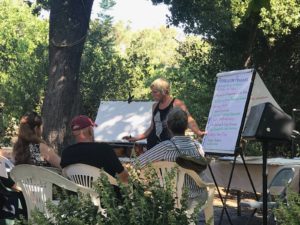 When it comes to the changing the environment and global climate change, the cause of the problem — humans — can also be the key to the solution.
When it comes to the changing the environment and global climate change, the cause of the problem — humans — can also be the key to the solution.
That was the hopeful message permaculture expert Lydia Neilsen brought to a crowd of listeners on a warm August Saturday morning at Morningsun Herb Farm in Vacaville. The event shared Neilsen’s insights on how permaculture can help restore the local water cycle and was also the official launch of Sustainable Solano’s expansion of its Sustainable Backyard program into Vacaville.
Neilsen began with an overview of the ethics and principles behind permaculture for a crowd where about one-third were new to the concept. Everything stems from the ethics of:
• Earth care (repair, conserve and regenerate)
• People care (seek peace and guard human rights everywhere)
• Fair share (giving back what you have extra of, whether time, money, produce, etc.)
“Our actions have become decoupled from their consequences,” she said. Permaculture involves getting back to that system of relationships.
She then turned to the intricacies of the water cycle and how that has been disrupted — and what can be done on an individual and community level to restore it locally.
“We have been treating rainwater as a nuisance,” she said, referring to how cities pave, pipe and drain water away.
That approach and the removal of plants create dry, dead soil and intensify heat. Rising heat can push water vapor away and create areas that are hotter and drier than if trees and vegetation were present to capture the sun’s rays and not only shade but also to photosynthesize and release oxygen and moisture back into the air. On the scale of a forest, trees work to harvest water vapor, creating low-pressure zones and pulling in more moisture, moving it inland. Take away the forests, and that cycle is disrupted.
“We’ve been impacting it for a long time negatively, and now we can impact it positively,” she said.
The permaculture approach of slowing, spreading and sinking water is a different approach from how rainwater has been treated, keeping water where it does the most good. The other factor in the equation is the need for vegetation.
So much that the world faces is on the global scale, but there is hope to be found in what can be addressed on the human scale.
“What can I do with my shovel to make an impact?” she said. An individual can do a lot through thoughtful observation to determine what needs to be done to help the land — and such efforts can spread. As one crowd member said, “It’s so easy. I mean, I know it’s not easy, but it’s so logical.”
A fruit tree guild — a central fruit tree surrounded by supporting plants that supply mulch, fix nitrogen, attract insects, suppress grass growth and help accumulate nutrients — is “a great place to start,” Neilsen said. Add a greywater system that reuses household water in the garden and it’s a step toward healing that local water cycle by nurturing water and plants on the property. “Imagine if whole neighborhoods were putting in food forests like this,” she said.
Sustainable Landscaping Program Manager Nicole Newell noted that approach is being used in Sustainable Solano’s backyard demonstration food forests. The program, which is taking applications through Sept. 21, will select two private yards and one public space in Vacaville for the demonstration gardens, which volunteers will create through a series of workshops to capture rainwater, install a greywater system and create water-wise, sustainable gardens.
Resources:
During her talk, Neilsen mentioned several books she turns to as resources on the topics she discussed. They include:
Water for the recovery of the climate — a new water paradigm (a research paper)
Hidden Nature: The startling insights of Viktor Schauberger (by Alick Bartholomew)
Permaculture: A Designer’s Manual by Bill Mollison
Rainwater Harvesting For Drylands And Beyond by Brad Lancaster
Jul 17, 2018
[Click here for full Daily Republic article]
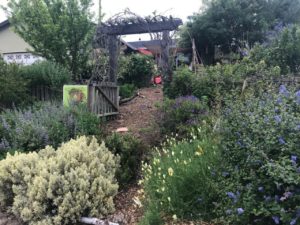
Sustainable Solano is a grassroots, county-wide movement uniting people and their initiatives aiming to serve the future of Solano County, to promote ecologically sustainable, economically and socially just communities. The organization had been expanding its mission of sustainable gardening since 2011 to include all forms of sustainable local food production (urban agriculture, permaculture, wise water landscape practices, Community Supported Agriculture partnerships and public education). Benicia Community Gardens changed its named to Sustainable Solano in 2016 to reflect its current scope and growing reach to actively engage all of Solano County. Sustainable Solano provides opportunities to local community members across the county to participate in four main initiatives: sustainable landscaping, local food movement, a community conversations speaker series and a sustainable neighborhoods pilot expanding on the sustainability framework to include renewable energy and shared small local solutions. Since 2016, its programs have extended to Vallejo, Fairfield and Suisun City.
Sustainable Solano will be launching its Sustainable Backyard program in Vacaville this August bringing educational, hands-on learning opportunities for residents interested in sustainable landscaping and wise water landscape practices to feed a landscape. This program focuses on transforming lawns and unproductive landscapes into lush, food-producing gardens fed primarily by secondary water sources (laundry-to-landscape greywater system and rainwater) and also brings inspiring talks on sustainable landscape design and permaculture principles.
The Vacaville Sustainable Backyard program will launch on August 11, 2018, with a talk by the permaculture expert Lydia Neilsen at Morningsun Herb Farm in Vacaville. The application period will be open to Vacaville homeowners and community public spaces to apply to become “food forest keepers” and have their yard transformed into a demonstration food forest garden. Highly visible, front-yard lawns are preferred but other types of landscapes (up to 2,000 square feet) are welcome to apply. Details about this expansion and a downloadable application will be available on the website homepage from August 11-September 21st.
Sites are assessed and chosen by Sustainable Solano’s Advisory Board made up of dedicated residents aiming to raise sustainability awareness in Solano County. Site selections are based on criteria such as: yard access, greywater feasibility, sun orientation and a commitment to community education.
There is no financial cost to Vacaville homeowners interested in being a part of this community-building project. The program will offer a series of free, hands-on public educational workshops where locals can learn about permaculture design and be part of the installation of these edible ecosystems fed by secondary water sources. There will be an annual tour of these demonstration food forest gardens.
The Sustainable Backyard program has successfully completed 15 demonstration food forests on both private and public land since the initial launch in 2015. Names given to these gardens are a reflection of the hopes and aspirations of the homeowner as part of their vision for the world they want to live in. Suisun City homeowner and food forest keeper of “A Growing Future” demonstration garden, Cassandra, had her lawn replaced with what she calls “a secure source of local food for my family with a surplus to share with the community”. For food forest keepers in Solano County, these gardens are a source of inspiration, resiliency and connection with neighbors. For Benicia food forest keeper Nam, the garden provided something else aside from birds, bees, flowers, fruits and vegetables. “This garden provided a place for meditation and a peaceful space during difficult times for our family.”
This project is made possible by the funding and support of the Solano County Water Agency.
The Sustainable Backyard will expand to Dixon and Rio Vista in 2019. Visit www.sustainablesolano.org and www.facebook.com/sustainablesolano for updates and details about this expansion.
In addition to self-sustaining, water-efficient landscapes, Sustainable Solano also envisions an environmentally and economically sustainable local food system. In September of 2017, it was awarded a planning grant by the USDA to begin developing a business plan for Community Food Centers in all seven cities. These food centers will serve as a hub for local food activities: CSA deliveries, cooking classes, and community education increasing access to seasonal, locally-produced food, better health for residents county-wide and a stronger local food economy.
[Click here for full article]
Jun 13, 2018
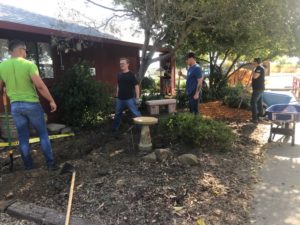 By: Nicole Newell, Sustainable Backyard Program Manager
By: Nicole Newell, Sustainable Backyard Program Manager
The work at Suisun Wildlife Center was the most interesting and busiest installation yet! As we were learning, working, and getting to know each other, the raptors and a one-eyed coyote were watching us. Volunteers stopped by to get bottles for the baby squirrels and raccoons that are receiving in-home care and wounded baby possums, squirrels, raccoons and birds arrived as we installed the pollinator food forest. We saw first-hand the service that Suisun Wildlife Center provides to California native wildlife. Throughout the three days, city council members, board members, and community members interested in water-efficiency and wildlife visited us.
Andrew Torres, a student from the Airman Leadership School Globemaster class contacted me a few days prior to the installation and asked if we had a community service project available for the class to join. This healthy crew of young men and women studying to be sergeants delivered 15 yards of tree chips and dug 60 feet of swales in only two hours! Each year 35, 263 gallons of water will be diverted from the roof to the swales. Suisun City Vice Mayor, Lori Wilson, coordinated lunch with local eateries and McDonalds donated chicken salads (yes they were tasty!). At lunchtime, we spoke to the Globemaster class and learned about the important role that community service plays in becoming sergeants. The foundation of this garden was completed and the class learned how to harvest water in-ground and build soil by adding tree chips.
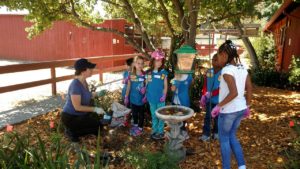 The next day, we did not have the help of the Globemaster class, but we did have a few solid participants that have been to our previous workshops ready to wrap up this project. Kevin brought his nifty drill that helped dig the holes and made planting in clay soil effortless. We planted over 30 different types of plants to attract pollinators. Rose from Morningsun Herb Farm recommended Newleaze Coral. This plant blooms from spring to fall and attracts many different types of bees including native bees. After we had our pizza lunch donated from Mountain Mikes, the Daisy Girl Scouts arrived to work on their honeybee award. The girls worked as a team to plant Russian Salvia; this plant attracts butterflies, hover flies and bees. Then they sprinkled laughter, joy and pollinator seeds all over the garden. Thank you to everyone that helped get this pollinator food forest installed at Suisun Wildlife Center. Vice Mayor Wilson supported the Suisun City Sustainable Backyard program from the beginning by introducing us to local organizations, launching our program at Denise Rushing’s speaker event and serving on the Advisory Board to help select both the private and public site in Suisun City.
The next day, we did not have the help of the Globemaster class, but we did have a few solid participants that have been to our previous workshops ready to wrap up this project. Kevin brought his nifty drill that helped dig the holes and made planting in clay soil effortless. We planted over 30 different types of plants to attract pollinators. Rose from Morningsun Herb Farm recommended Newleaze Coral. This plant blooms from spring to fall and attracts many different types of bees including native bees. After we had our pizza lunch donated from Mountain Mikes, the Daisy Girl Scouts arrived to work on their honeybee award. The girls worked as a team to plant Russian Salvia; this plant attracts butterflies, hover flies and bees. Then they sprinkled laughter, joy and pollinator seeds all over the garden. Thank you to everyone that helped get this pollinator food forest installed at Suisun Wildlife Center. Vice Mayor Wilson supported the Suisun City Sustainable Backyard program from the beginning by introducing us to local organizations, launching our program at Denise Rushing’s speaker event and serving on the Advisory Board to help select both the private and public site in Suisun City.
This demonstration pollinator food forest at Suisun Wildlife Center is a public project funded by the Solano County Water Agency. The garden will serve as a community asset where people can learn simple techniques to design a resilient, water-wise landscape.
May 31, 2018
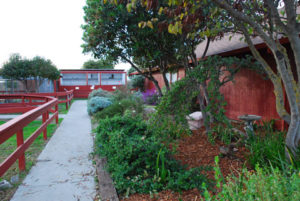 Sustainable Solano’s Sustainable Backyard program expanded to Suisun City earlier this spring and is now celebrating the completion of a public demonstration food forest garden at a private Suisun residence. The program offers informative workshops and inspiring talks on sustainable landscape design, community resilience and permaculture.
Sustainable Solano’s Sustainable Backyard program expanded to Suisun City earlier this spring and is now celebrating the completion of a public demonstration food forest garden at a private Suisun residence. The program offers informative workshops and inspiring talks on sustainable landscape design, community resilience and permaculture.
On Saturday, June 9th and Sunday, June 10th, community members are invited to help create a thriving ecosystem for pollinators, such as birds, bees, and butterflies, at Suisun Wildlife Center (SWC). This custom demonstration garden will focus on year-round pollinator plants and habitat for wildlife and will be fed primarily through secondary water sources such as roofwater diverted to swales. SWC is a non-profit volunteer organization dedicated to the rescue of native California wildlife to ensure that birds and animals receive the best possible care.
Attendees will have the opportunity to learn hands-on how to build a proper foundation for a permaculture food forest, how to increase water-holding capacity in the ground, tips for building healthy soil in the garden and basic permaculture design principles that can be applied at home for self-sustaining, food-producing gardens all year-round.
Thank you to Vice Mayor, Lori Wilson, for coordinating lunch with local eateries on both days.
Workshop Dates:
Saturday, June 9th (Installation Day 1:) Laying the foundation: digging on contour swales, making berms and diverting the roof water to the landscape. Register here.
Sunday, June 10th (Installation Day 2): Creating habitat. Register here.
- Planting a community of pollinator plants with multiple functions that support a healthy, diverse ecosystem.
- Surface drip irrigation installation: Adding irrigation for young plants and water conservation.
- Covering the food forest with free woodchips (mulch) to prevent water evaporation and improve soil health.
There will be yearly ongoing workshops and tours of these demonstration food forest gardens on private and public land in each city. This project is made possible by funding and support of the Solano County Water Agency
May 18, 2018
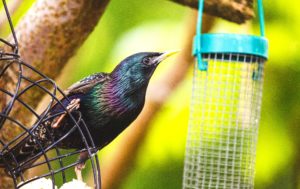 By: Nicole Newell, Sustainable Backyard Program Manager
By: Nicole Newell, Sustainable Backyard Program Manager
I am finding many Solano County treasures as our Sustainable Backyard Program expands. Suisun Wildlife Center is one of the jewels. Last weekend I learned first-hand the many incredible ways that this organization serves California native wildlife and the Suisun Marsh. I was invited on an educational walk through the area with Executive Director, Monique Liguori, leading this walk. She spoke about the Native American Suisunes tribe (also called the “People of the West Wind”), who lived in the Suisun Marsh regions of Solano County around 200 years ago, and the various plants they used.
One of the many diverse plants that was showcased was the tule rush. The Suisunes people built temporary homes, canoes and made clothing out of this plant. Since the tule rushes are biodegradable, every year these items had to be rebuilt. My head was filled with so many new facts about native plants in the marsh. I even got to taste salty pickleweed!
Not only does the Suisun Wildlife Center protect and educate the public about the Suisun Marsh, but they also rescue and care for California native wildlife. The ultimate goal is to release the wildlife back into its environment. Due to the extent of animal injury, resident raptors and a coyote cannot be released and need year-round care. Kris, Monique and many other committed volunteers gently care for these young and injured animals 365 days a year!
Currently they are taking care of:
20 baby oppossums
30 song birds
7 baby raccoons
6 baby squirrels
1 adult barn owl
This spring, Monique has gently cared for nine baby hummingbirds. These sensitive creatures eat every 15 minutes from sun up to sun down and will only eat if the feeder are in a balanced state of mind while feeding them. The dedication of Suisun Wildlife Center has inspired our Sustainable Backyard program to think about the importance of serving wildlife when designing demonstration gardens. In June, we will be installing a food forest that is focused on providing food to our precious pollinators.
Thank you Kris and Suisun Wildlife Center for all that you do!
Mar 30, 2018
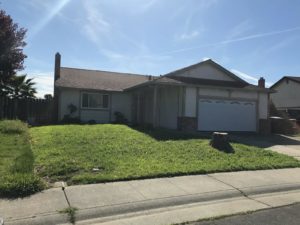 One private yard in Suisun City has been selected for the installation of a demonstration food forest garden as part of Sustainable Solano’s Sustainable Backyard program offering informative workshops and inspiring talks on sustainable landscape design, community resilience, permaculture, and local food systems. The first of three public installation workshops will be held on Saturday, April 7th, at a private Suisun residence, where community members can help create the foundation of an edible ecosystem fed by secondary water sources such as greywater (laundry-to-landscape system) and roofwater. This workshop will focus on digging swales, making birms, diverting roofwater and planting fruit trees to increase water-holding capacity and building healthy soil in the garden.
One private yard in Suisun City has been selected for the installation of a demonstration food forest garden as part of Sustainable Solano’s Sustainable Backyard program offering informative workshops and inspiring talks on sustainable landscape design, community resilience, permaculture, and local food systems. The first of three public installation workshops will be held on Saturday, April 7th, at a private Suisun residence, where community members can help create the foundation of an edible ecosystem fed by secondary water sources such as greywater (laundry-to-landscape system) and roofwater. This workshop will focus on digging swales, making birms, diverting roofwater and planting fruit trees to increase water-holding capacity and building healthy soil in the garden.
Selected homeowner, Cassandra, a resident of Suisun City for over 21 years and passionate about growing food and healthy eating, was looking to replace her lawn with a more sustainable landscape that her family could eat from. This led her to apply to have her yard transformed into a steady, water-retaining food source that would not only increase resilience but catch the attention of lawn owners lining her neighborhood streets. “This project will help secure a source of local food for my family with a surplus to share with the community”, Cassandra said. The family has named the garden, “A Growing Future”.
Through this project, she will be joining a growing family of “food forest keepers” in Solano County that have committed to opening their demonstration food forest gardens for the public to learn about simple sustainable landscape techniques and ways to use water more wisely to grow food.
Her yard was selected among four other Suisun City homeowner applicants. The selection process for these sites are based on criteria such as yard access, greywater feasibility and sun orientation. Sites are assessed and selected by Sustainable Solano’s Sustainable Landscaping Advisory Board made up of dedicated Solano County residents aiming to raise sustainability awareness in Solano County.
The garden will take three full days to complete and all installation events are free and open to the community. There will be yearly ongoing workshops and tours of these demonstration food forest gardens on private and public land in each city. This project is made possible by funding and support of the Solano County Water Agency.
Registration is required for these FREE hands-on workshops. Visit our calendar to register.
The Sustainable Backyard and Conversations program will expand to Vacaville in the fall of 2018. Visit www.sustainablesolano.org and www.facebook.com/sustainablesolano for updates and details about this expansion.
 When it comes to the changing the environment and global climate change, the cause of the problem — humans — can also be the key to the solution.
When it comes to the changing the environment and global climate change, the cause of the problem — humans — can also be the key to the solution.

 By: Nicole Newell, Sustainable Backyard Program Manager
By: Nicole Newell, Sustainable Backyard Program Manager The next day, we did not have the help of the Globemaster class, but we did have a few solid participants that have been to our previous workshops ready to wrap up this project. Kevin brought his nifty drill that helped dig the holes and made planting in clay soil effortless. We planted over 30 different types of plants to attract pollinators. Rose from Morningsun Herb Farm recommended Newleaze Coral. This plant blooms from spring to fall and attracts many different types of bees including native bees. After we had our pizza lunch donated from Mountain Mikes, the Daisy Girl Scouts arrived to work on their honeybee award. The girls worked as a team to plant Russian Salvia; this plant attracts butterflies, hover flies and bees. Then they sprinkled laughter, joy and pollinator seeds all over the garden. Thank you to everyone that helped get this pollinator food forest installed at Suisun Wildlife Center. Vice Mayor Wilson supported the Suisun City Sustainable Backyard program from the beginning by introducing us to local organizations, launching our program at Denise Rushing’s speaker event and serving on the Advisory Board to help select both the private and public site in Suisun City.
The next day, we did not have the help of the Globemaster class, but we did have a few solid participants that have been to our previous workshops ready to wrap up this project. Kevin brought his nifty drill that helped dig the holes and made planting in clay soil effortless. We planted over 30 different types of plants to attract pollinators. Rose from Morningsun Herb Farm recommended Newleaze Coral. This plant blooms from spring to fall and attracts many different types of bees including native bees. After we had our pizza lunch donated from Mountain Mikes, the Daisy Girl Scouts arrived to work on their honeybee award. The girls worked as a team to plant Russian Salvia; this plant attracts butterflies, hover flies and bees. Then they sprinkled laughter, joy and pollinator seeds all over the garden. Thank you to everyone that helped get this pollinator food forest installed at Suisun Wildlife Center. Vice Mayor Wilson supported the Suisun City Sustainable Backyard program from the beginning by introducing us to local organizations, launching our program at Denise Rushing’s speaker event and serving on the Advisory Board to help select both the private and public site in Suisun City. Sustainable Solano’s Sustainable Backyard program expanded to Suisun City earlier this spring and is now celebrating the completion of a public demonstration food forest garden at a private Suisun residence. The program offers informative workshops and inspiring talks on sustainable landscape design, community resilience and permaculture.
Sustainable Solano’s Sustainable Backyard program expanded to Suisun City earlier this spring and is now celebrating the completion of a public demonstration food forest garden at a private Suisun residence. The program offers informative workshops and inspiring talks on sustainable landscape design, community resilience and permaculture. By: Nicole Newell, Sustainable Backyard Program Manager
By: Nicole Newell, Sustainable Backyard Program Manager One private yard in Suisun City has been selected for the installation of a demonstration food forest garden as part of Sustainable Solano’s Sustainable Backyard program offering informative workshops and inspiring talks on sustainable landscape design, community resilience, permaculture, and local food systems. The first of three public installation workshops will be held on Saturday, April 7th, at a private Suisun residence, where community members can help create the foundation of an edible ecosystem fed by secondary water sources such as greywater (laundry-to-landscape system) and roofwater. This workshop will focus on digging swales, making birms, diverting roofwater and planting fruit trees to increase water-holding capacity and building healthy soil in the garden.
One private yard in Suisun City has been selected for the installation of a demonstration food forest garden as part of Sustainable Solano’s Sustainable Backyard program offering informative workshops and inspiring talks on sustainable landscape design, community resilience, permaculture, and local food systems. The first of three public installation workshops will be held on Saturday, April 7th, at a private Suisun residence, where community members can help create the foundation of an edible ecosystem fed by secondary water sources such as greywater (laundry-to-landscape system) and roofwater. This workshop will focus on digging swales, making birms, diverting roofwater and planting fruit trees to increase water-holding capacity and building healthy soil in the garden.